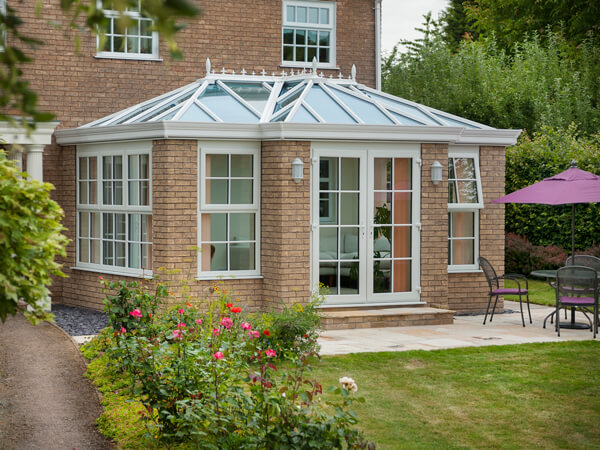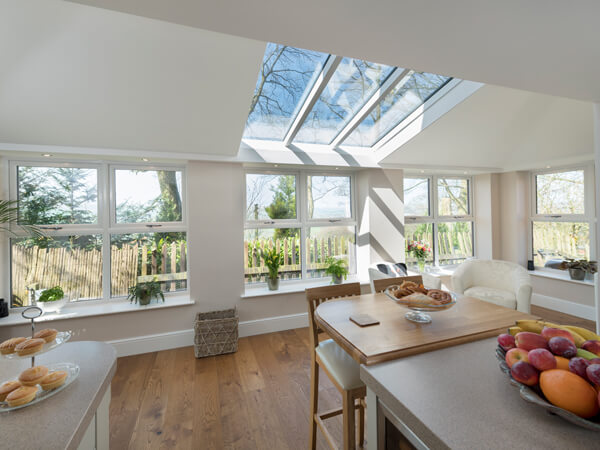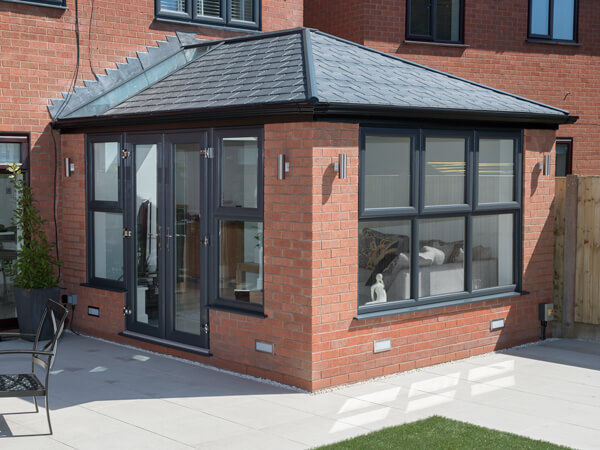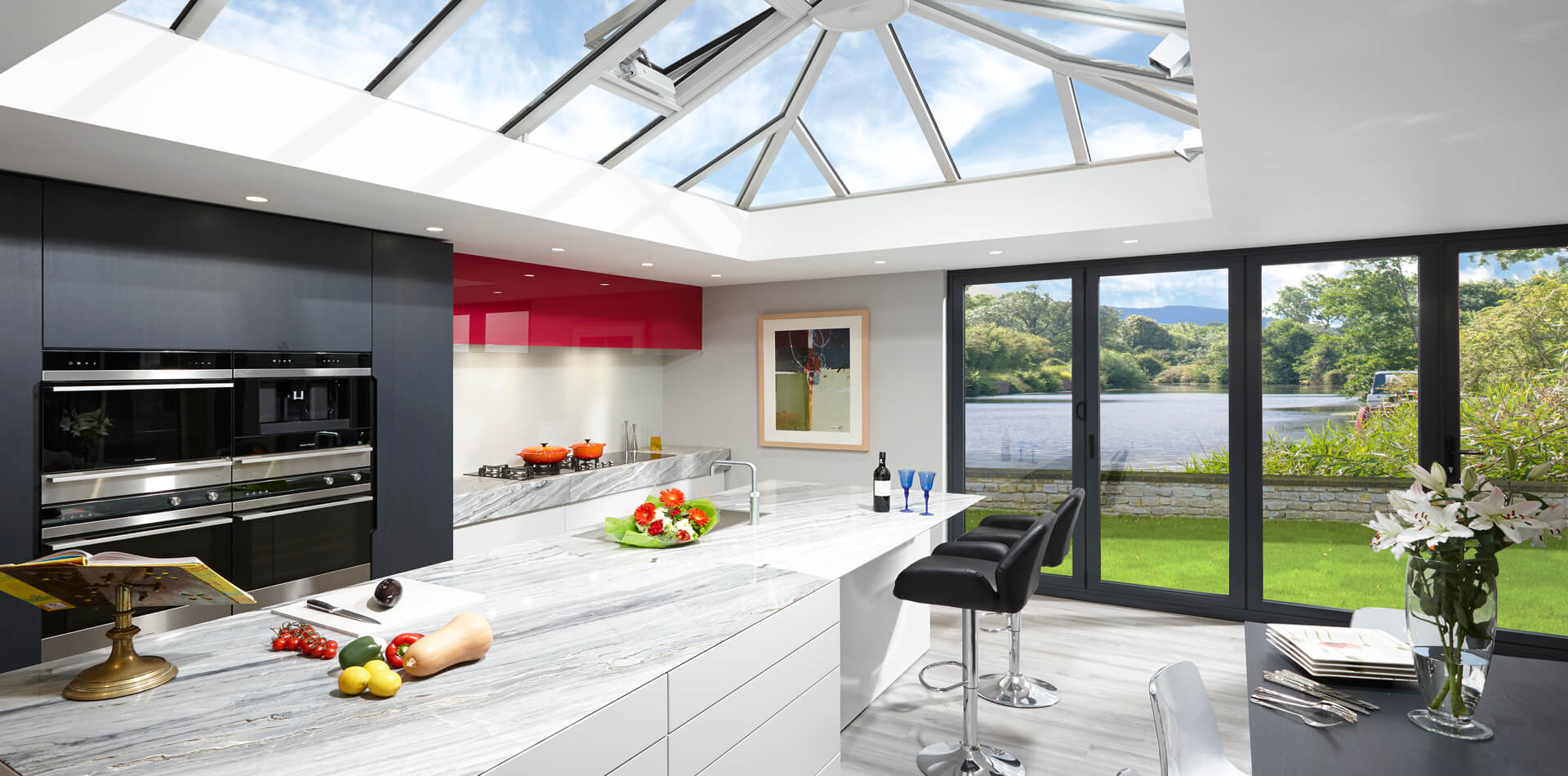What is the difference between conservatories, orangeries, and home extensions?
That’s a tricky one to answer nowadays as they are almost interchangeable, so they don’t need to be defined as such. To put it plainly, a living space can be anything you like. In times past, you would regard a conservatory as an extension that’s practically glazed throughout – glass roof, glass walls etc. with beautiful garden and aerial views. But as technology has progressed, conservatories can now come with a tiled roof and dwarf walls, making them better-insulating than previous designs. You also have solar control glazing for conservatories to avoid them providing poor temperature regulation.
Your standard orangery has brick or aluminium pillars, which gives you privacy when inside and warmth, leaving you with a luxurious atmosphere. A pelmet will also generally span the perimeter of the roof and offer thermal comfort. As for its roof, you can have a glass lantern, solid tiled roof, or roofing system that has characteristics of both.

If you want something that looks like a natural extension of your property, a home extension is the logical choice. They look, and feel, solid in their structure, and will normally have a solid tiled roof on top of them. You can have a hybrid roof though, incorporating full length glass panels and / or Velux windows for light transference and ventilation. It’s the year-round useability of a home extension that makes them so appealing to a high percentage of householders.
At the end of the day, does it really matter what you call it? We don’t believe so and will assist however we can.

A tiled roof or glass roof, which do you recommend?
This will come down to how the room will be used, the direction it faces and what you are prepared to spend. Most people want their extension to receive lots of natural light, which is where solar control glazing is essential. It will regulate the internal temperature so that you’re never left with an extension that’s inhabitable at certain times.
A solid tiled roof will assure you of an extension that you can forever rely on for comfort, especially if it also has full length glass panels or Velux windows in it. This will make a hybrid of a solid and glass roof, two products that offer multiple individual benefits.
For a discussion about roofing systems, speak to an RMC advisor, who can offer informed guidance.

MORE COMMON QUESTIONS
Don’t be afraid to ask us any questions – we always like answering them. You may find the question you have amongst our most common questions.
Is the space likely to get too hot or too cold?
No, as we build our living spaces using thermally efficient materials and methods. You won’t face a situation like you would in a conservatory with a polycarbonate roof, where in summer it would seriously burn up. The solar control glazing that we have will also protect against this, and we also have a tiled roofing system that’s specifically designed to resist extreme heat and extreme cold from the outdoors.
Do you make your roofing systems?
RMC is a member of the Conservatory Outlet Retail Network, and it just so happens that Conservatory Outlet, its sister company, is one of the country’s leading roof manufacturers. The roofs are built in their hi-tech manufacturing facility, located in Wakefield, West Yorkshire.
The advantage of having such a close tie to our manufacturer is that we can stringently monitor our supply chain, keeping tabs on its quality and making sure it never diminishes.
It is possible to have roof tiles that match my home?
Yes, that won’t be a problem. We can give you access to shingle and slate roof tile options and match them accordingly to your roofing tiles so that they complement each other. A series of flat membranes are also available. Discuss this with an RMC advisor if you want to know more.
What are ‘A’ energy rated windows?
‘A’ rated windows are currently the most energy efficient windows that you can buy in the UK, as defined by the BFRC Rating Scheme. All replacement windows are rated for their energy efficient qualities in accordance with the scheme, and it also tells you if they comply with Building Regulations.
Window Energy Ratings work in a similar fashion to the traffic-light style used to rank the energy efficient qualities of ‘white’ goods e.g., fridges, freezers, washing machines. Pay attention to this energy labelling before you proceed with any window investment.
What is solar control glazing?
Although you can’t see it, solar control glazing has a coating that deflects excess heat away from a room and retains the heat produced by a boiler. This glass can be tinted, which will determine the amount of light transmission and heat retention that occurs. Chat to an RMC advisor about this.
Can you brick match?
We can usually do so without much difficulty. RMC has a good relationship with many local brick merchants and will try to locate a suitable brick match prior to the build. Please note that there can be weathering and manufacturing differences between new and existing bricks. In the event of us not being able to find an appropriate match, the brickwork can be tinted, but this will require an additional cost.
Will Building Regulations Approval be required?
Generally, when extending, you will need Building Regulations Approval first. However, certain extensions are exempt from this. One of our surveyors will clarify the position as they are fully up-to-speed with everything to do with planning and building regulations. If it turns out that Building Regulations Approval is necessary, RMC will assist with organising it.
Do I need planning permission?
Extensions & Conservatories
You don’t require planning permission if the extension meets certain rules. This is called ‘permitted development’.
If your extension will have one storey, you don’t need planning permission as long as:
- it’s located at the back of the house
- it doesn’t go back further than 3 metres if it’s a terraced house, or 4 metres
- if it isn’t the height of the eaves (where the wall meets the roof) is no higher than 3 metres
- it’s not higher than 4 metres, including sloping roofs
- it doesn’t cover more floor area than your house does
- it doesn’t take up half the ‘curtilage’ – the grounds behind your home
- it isn’t within a conservation area
If you want to add a porch to a front door, back door or side door on your house,
different rules apply.
Porches
You won’t need planning permission to add a porch to a front door, back door or side door on your house as long as:
- its footprint (the total floor area it takes up) is no greater than 3 square metres
- there’s at least 2 metres between the edge of the porch and any boundary facing a road
- it isn’t taller than 3 metres
- it isn’t within a conservation area
What is the expected build time?
It will be easier to answer once we know the complexity of the build and have official confirmation of whether a planning application needs to be made. Ask for a copy of our ‘What happens next’ guide to get any idea of timescales.
What is a test dig?
We carry out a test dig at the proposed site of an extension to check that the local ground conditions are fit enough to hold a traditional concrete base and foundation. If we discover that the ground conditions are not sufficient we will advise on an alternative foundation proposal such as a specialist pile foundation or concrete raft.
What is a cavity tray?
The job of a cavity tray is to stop any moisture that penetrates an outer wall from becoming visible inside an extension. It consists of a series of high level damp proof courses that bridge a wall cavity to direct moisture to the external face of a wall where the extension roof joins the house wall.
Do you offer finance to help me pay for for my new living space?
Yes. To make life easy for you, RMC can arrange a variety of affordable and convenient easy payment finance options (subject to application & status). Applying for finance is simple and we promise you a quick decision. Everything can be sorted out with you in the comfort of your home or at your local RMC Showroom, so you can enjoy whatever you’ve set your heart on right away.
What do we need to do when our finance is approved?
If you’re arranging your own finance, you’ll need to call us as soon as you get the go ahead. If you’re taking up one of our offers, the company will tell us both directly, so there’s no need to call as we will get in touch with you.
What happens if finance is refused?
Finance companies can turn down people for lots of reasons, for example if you’ve moved several times over the past few years. In these circumstances, we always do our best to help and sometimes it’s worth trying another provider, especially if they know you.
I’ve applied for finance with RMC. How long will approval take?
Sometimes our finance company will say ‘yes’ almost immediately and on other occasions it may take them a few days. This short delay can be for any number of reasons and you should not be unduly concerned.
NEED MORE ANSWERS?
Simply fill in your details below and one of our customer advisors will get in touch to answer any of your questions.
